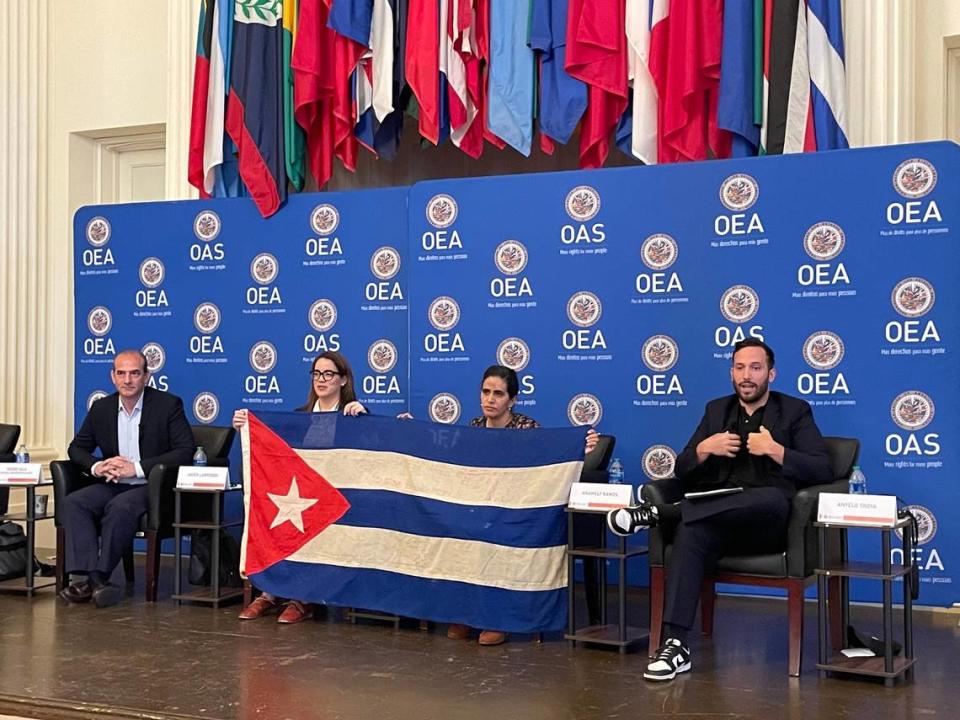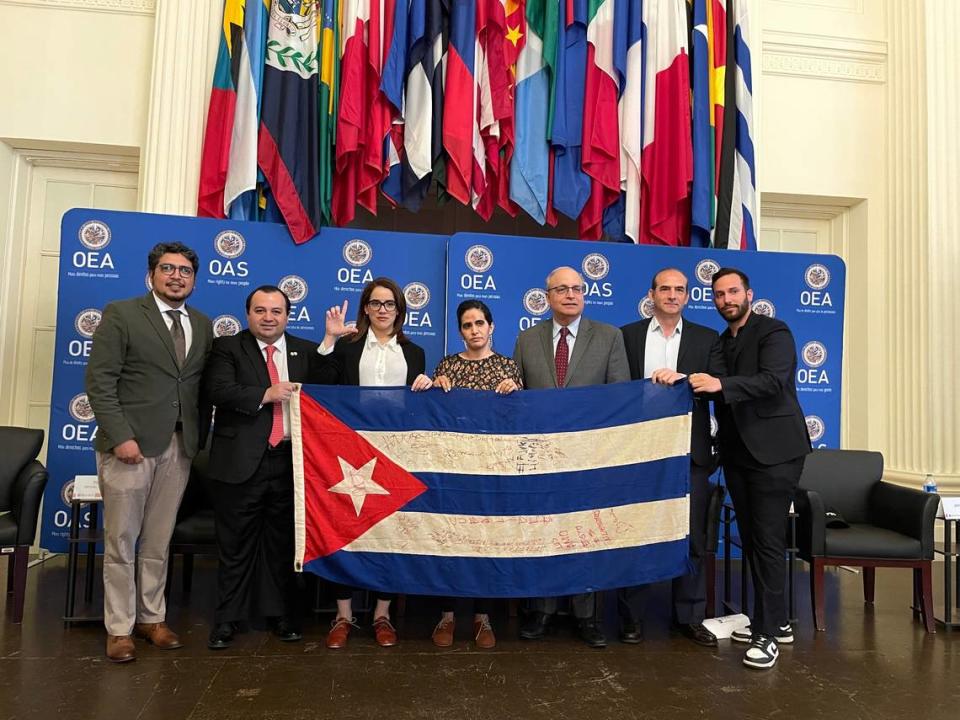Activists warn of a human-rights crisis in Cuba during event hosted by the OAS in Washington
- Oops!Something went wrong.Please try again later.
The human-rights situation in Cuba has deteriorated dramatically, with the country holding more than a thousand political prisoners amid a crackdown on freedom of expression and association that poses a unique challenge in the Americas, several Cuban dissidents, activists, journalists and artists, as well as Organization of American States officials, said during an event hosted by the regional organization in Washington on Tuesday.
“The Cuban case is different from other countries because the violations of freedom of expression and association are of systematic and widespread origin, part of the mechanisms through which the regime maintains power, and it is a state policy to deny citizens basic freedoms,” said Edgar Stuardo Ralón Orellana, who is charged with reporting on the rights of persons deprived of liberty in the Inter-American Commission on Human Rights, which is part of the OAS.
Ralón Orellana said the commission had received several complaints and documented several strategies the Cuban government deploys to deny freedom of expression and censor critics, among them arbitrary detentions, interrogations, internet censorship, travel bans and threats to family members.
“These are not new strategies, and they continue to deteriorate rapidly,” he said, adding that while Cuba is not an active member of the OAS, it is one of its founding members and is still bound under the organization’s charter to comply with the recommendations made by the commission.
OAS Secretary Luis Almagro said Cuba should not be an exception in the Americas.
“The situation of Cuba and the political prisoners cannot be made invisible,” he said. “We have an important role to play. Cubans have a right to democracy.”
According to Prisoners Defenders, a Madrid-based organization, there are currently 1,066 political prisoners in Cuba, a number that skyrocketed after the islandwide protests on July 11, 2021. Among them there are 17 minors sentenced under sedition convictions, the organization’s president, Javier Larrondo, said.
“Now the prisons in Cuba have people who were not dissidents but simple families who took to the streets to demonstrate,” he said. “This repression is not occasional, it is structural.”
The Cuban government does not recognize political prisoners, arguing they have all committed common crimes. Larrondo said many of the crimes punished under current Cuban law are vaguely defined and would not be considered as such in democratic countries.
While the number of prisoners reported by Prisoners Defenders cannot be independently confirmed because the Cuban government does not provide official numbers nor allow international observers to visit Cuban prisons, the figure is in line with the one reported by other civil society organizations.
Larrondo said the treatment the July 11 protesters received violated legal standards, because many were sentenced after summary trials, were arrested under orders of police officers, not judges, and did not have access to independent lawyers but lawyers working for the Cuban state.
In pre-recorded videos, long-term Cuban dissidents Berta Soler, Marta Beatriz Roque and Ivan Fernandez Carrillo warned of a wave of “increased repression” on the island and shared their concerns about the treatment opposition members Jose Daniel Ferrer and Felix Navarro are receiving in prison. They were both imprisoned for participating in the July 11 protests.
They said Ferrer, the leader of the opposition organization UNPACU, has been in isolation in a prison cell in a facility in Santiago de Cuba and that both he and Navarro have been denied medical care.
In a series of presentations, Cuban activists shared personal accounts of how government repression has impacted their lives while providing analytical insights on the patterns Cuban authorities follow to quash dissent. In particular, they highlighted how the government has censored the arts, harassed independent journalists and artists and ultimately sent the leaders of the San Isidro Movement, a loose collective of young artists, academics and activists, to jail.
Cuban visual artist Anyelo Troya shared pictures documenting the surveillance by Cuban officials while he was serving a one-year home detention sentence after he was convicted of “public disorder” charges for participating in anti-government protests on July 11.
He said he had never met the police officers who made the accusation against him, which was enough to convict him. He said he was beaten in jail and his family members threatened.
He also shared images of his work with artists Luis Manuel Otero Alcántara and rapper Maykel “Osogbo” Castillo in the production of the video clip for “Patria y Vida” (Homeland and Life), the song that later became an anthem for the protesters. Both men are currently in prison for participating in the anti-government demonstrations.
In a presentation focused on how the Cuban government has crushed independent artists, Anamely Ramos, a Cuban activist and art professor, referred to a letter recently written by 15 Cuban women imprisoned who demanded freedom and signed with their blood.
“As much as I think about it, I cannot think of a greater example of culture: people who have sacrificed their well-being and even personal freedom for a greater good for themselves, for a future for all. I can’t think of anything less artistic either,” she said. “In Cuba, there is no greater art than surviving the state violence in which one is born.”
Ramos, whom Cuban authorities have not allowed to return to the island because of her activism, also detailed how the harassment of critics works on the island: it starts with getting fired from the person’s state job, followed by interrogations in which state security officials pretend to be friendly at first, she said, and then escalate into open threats, public acts of repudiation, home detention or fabricated crimes that lead to serving time in prison or exile to avoid going to jail.
The use of public spaces is particularly punished, she said, recalling the five-year sentence imposed to Luis Robles, a young man who held an anti-government sign in a Havana street.
She told the Herald that activists worried about the health of Otero Alcántara too. “He frequently faints and during one of these blackouts, he fell and damaged his knee.” His fate, and that of Grammy award winner Castillo, opposition leader Ferrer and hundreds of other Cubans imprisoned for participating in peaceful protests hang on the will of Cuban authorities to release them, though they have given no sign so far that they will do so, several European and American diplomats have told the Herald.
Cuban officials have insisted the island was unjustly included in the list of countries that sponsor terrorism and have demanded its delisting. But the U.S. Secretary of State Antony Blinken recently said during a congressional hearing that the government does not meet the conditions for its removal.
Frank Mora, the U.S. ambassador to the OAS, who helped organize the event, told the Herald the organization will continue pressing members to have discussions about Cuba.
“Unfortunately the international community ignores or has abandoned the Cuban people,” he said. ”In the OAS there is no consensus to follow up on the Cuban drama as is being done in the Nicaraguan case. The United States’ mission is committed to ensuring that the organization and the international community do not forget what is happening in Cuba.”
“The situation in Cuba has been going on for more than six decades and people ‘get tired,’ but that is not an excuse to simply ignore the Cuban tragedy,” he added.
For more than two years the OAS, the world’s oldest regional organization, had no U.S. representative. After his appointment last December, Mora told reporters he wanted to help revitalize the organization and focus on strengthening democratic values in a region where populism and authoritarianism are on the rise.
But such efforts have at times encountered pushback from some countries in the region.
Uruguay’s ambassador to the OAS, Washington Abdala, said during the event Tuesday that he faced reluctance from other members when he wanted to organize a similar event about Cuba.
“Human rights violations concern the entire international community and cannot be downplayed,” said Cuban journalist Monica Baró, who was one of the presenters. “I urge the international community not to romanticize authoritarian regimes.”
“Sometimes Cuba can seem like a pretty exhausting subject,” she said, “but I assure you that we Cubans are the most exhausted in this story.”


